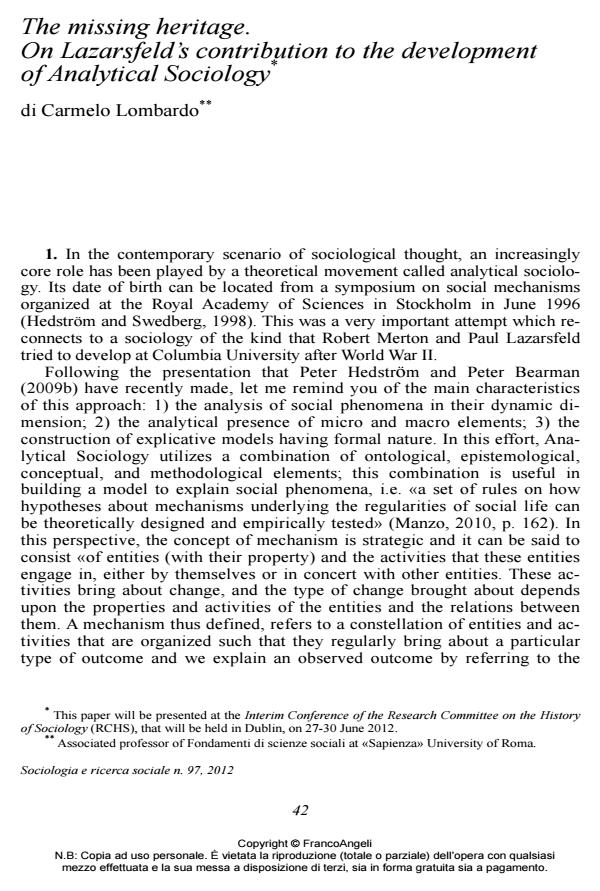The missing heritage. On Lazarsfeld’s contribution to the development of Analytical Sociology
Titolo Rivista SOCIOLOGIA E RICERCA SOCIALE
Autori/Curatori Carmelo Lombardo
Anno di pubblicazione 2012 Fascicolo 2012/97
Lingua Inglese Numero pagine 8 P. 42-49 Dimensione file 588 KB
DOI 10.3280/SR2012-097005
Il DOI è il codice a barre della proprietà intellettuale: per saperne di più
clicca qui
Qui sotto puoi vedere in anteprima la prima pagina di questo articolo.
Se questo articolo ti interessa, lo puoi acquistare (e scaricare in formato pdf) seguendo le facili indicazioni per acquistare il download credit. Acquista Download Credits per scaricare questo Articolo in formato PDF

FrancoAngeli è membro della Publishers International Linking Association, Inc (PILA)associazione indipendente e non profit per facilitare (attraverso i servizi tecnologici implementati da CrossRef.org) l’accesso degli studiosi ai contenuti digitali nelle pubblicazioni professionali e scientifiche
In the contemporary scenario of sociological thought an increasingly central role has been played by a theoretical movement called analytical sociology. This is a very important attempt which reconnects to the kind of sociology that Robert Merton and Paul Lazarsfeld tried to develop at Columbia University after World War II. In the Oxford Handbook of Analytical Sociology, recently edited by Peter Hëdstrom and Peter Bearman, a middle range sociology is presented, following the Columbia tradition. But, strangely, the Handbook refers only to Merton as founding father of the Columbia tradition, and does not take into consideration Lazarsfeld’s contribution. On the contrary, the role played by Lazarsfeld in the beginning of generative models for explaining social phenomena is highly relevant. His attention towards the inter-subjective dimension of decision testifies his interest for phenomena generating mechanisms, also exemplified by his way of working, which refers to an analytical distinction between the concept of mechanism and that of process; a methodological distinction between causality and mutual effect; a conceptual assumption of different kinds of rationality, i.e. the idea that actors act reasonably and intentionally.
- Teorie dell'azione, sistemi di interdipendenza e meccanismi generativi. Prospettive di sviluppo nello studio della mobilità sociale Pasquale di Padova, in SOCIOLOGIA E RICERCA SOCIALE 112/2017 pp.47
DOI: 10.3280/SR2017-112003
Carmelo Lombardo, The missing heritage. On Lazarsfeld’s contribution to the development of Analytical Sociology in "SOCIOLOGIA E RICERCA SOCIALE " 97/2012, pp 42-49, DOI: 10.3280/SR2012-097005